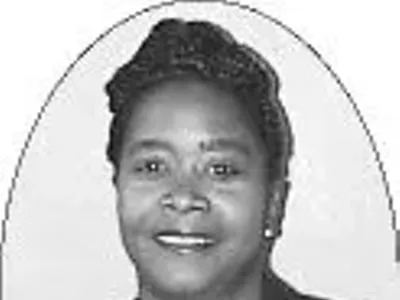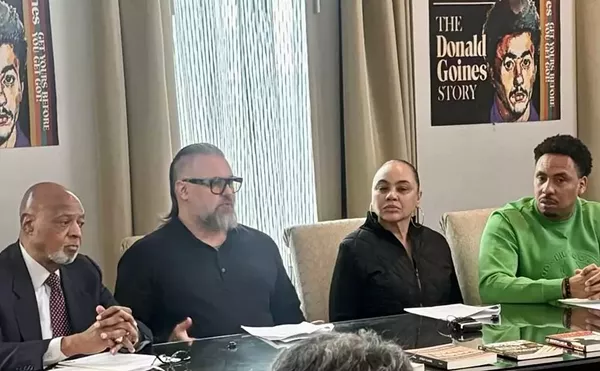DON'T CALL IT A COMEBACK
As techno producer Alan Oldham once said, "Detroiters are sick of hearing how stupid they are for not liking techno." This may explain why the masses around these parts have turned to booty to get their groove on, and the hipsters to deep house, as heard in the sublime after-hours sets of DJ Scott Grooves at the packed club Better Days on Saturday nights. Still, there's no denying there is some equity in the original Detroit sound. But these days, it seems the scene has aged better than the sound. While clubs such as Better Days thrive and ravers still rave, the melodic Detroit Techno sound that a decade ago seemed so pioneering hasn't aged particularly well - Derrick May's "Strings of Life" sounded so anthemic then, but sounds hopelessly sappy now. While, before now, techno's originators have been content to rest on their admittedly thinning laurels while major label electronica and UK imports dent the American pop market, there have been rumblings among some of Detroit's veteran producer/DJs about a desire to re-enter the fray by teaming up with American black independent labels. Thus far, labels aren't as interested as they could be. Says Yin-Sight Management's Laura Gavoor, who works closely with Kevin Saunderson, Juan Atkins and new-schooler Stacy Pullen among others, "I've talked to a lot of labels" - she ain't sayin' who, but rest assured Puffy knows who Derrick May is &emdash; "and all they seem interested in is what's happening in UK right now with the house and drum 'n' bass who are always saying how influenced they were by the Detroit sound. But the companies just don't get that this is black urban American music that's funky as hell."
Well, part of the problem may be defining what this is. Lumped together for the purposes of the European press a decade ago, the Detroit sound has never been easy to categorize, though its Europhilic roots and penchant for gauzy synth wafts and sentimental melodies are as much an asset as a liability. What dates it is still its greatest strength. Says Gavoor, "The problem with most dance music is that it lacks any emotion, and the Detroit sound has always had a lot of emotion to it."
The dilemma Detroit's old(er) school producers now face is how to step up to today's market without disrupting their delicate shrines to their "legendary" pasts. Kevin Saunderson, for his part, has kept hope alive with frequent if less remarkable releases under his E-Dancer moniker while Juan Atkins seems content with the fact that his hit-making days of Cybrotron and old Model 500 are behind him, as his lackluster TVT/WaxTrax mix record and ambitious but at times frustratingly downtempo new Model 500 record (due out spring '99 on Germany's R&S label) show. Derrick May, the only hissy-fit deejay who can land his mug on magazine covers without a new release in sight, is even working on new material. Meanwhile, Stacey Pullen's next generation techno-house/DJ-as-educator aesthetic has landed him a deal with Science/Virgin UK and a record due out on the US electronica clearing house Astralwerks next year, while the Carl Craig-helmed techno-jazz project Innerzone Orchestra is in the middle of a bidding war between Polygram, Astralwerks and the like. Nice work.
Meanwhile, and perhaps more importantly, techno's originators are rediscovering the value of nurturing their hometown scene, no matter how awkward it may seem at first. Says Gavoor, "They realize how important it is to do things here; they're even talking about opening a club of their own."
Which, it must be said, we've heard before, but efforts so far to that end show that they deserve the benefit of the doubt. Saunderson laudably sponsored Thanksgiving's "Fluid" party and now teams up with original Music Institute resident D Wynn to throw Christmas night's "Evolution" party, which features the first live band appearance of Atkins' Model 500 ever (more info: 248-975-8103). Parties in Detroit? Live bands? These guys seem like they're ready to play ball. Carl Craig, contrary to his globetrotting take-the-money-and-run deejay persona of five years ago, has been playing small house parties around town. Even the usually hamstrung militancy of Underground Resistance's Mad Mike Banks has lightened up; ever the musician, he's working with two prominent UK dance music producers on new music. Hopefully as Detroit's old school sees that the Fatboy Slims and the Stardusts of the world ain't rocket scientists, but instead just yahoos who'd rather rock a party than have a chip on their shoulder about dance music, the city's techno producers can adapt and their talent that made them so "important" a decade ago and make themselves relevant today.
In an age when Chicago underground house stalwart Ray Davis Jr. can remix R&B hip-hoptress Faith Evans, it's about time. As Derrick May told Spin magazine, "We sold ourselves short, not out."
Maybe now, between Gavoor's record biz savvy and their own wherewithal, they'll not only have something to sell, but something worth buying.






